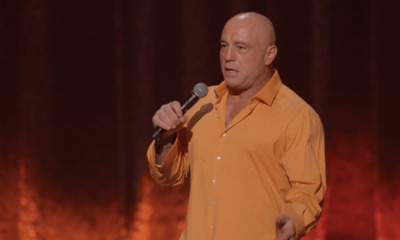Entertainment
COVID and trans jokes spoil the Netflix special

Netflix has found the stopgap solution for the gaps between Dave Chappelle specials.
Chappelle, the modern comedian whose legacy has been complicated by the anti-trans material in his Netflix specials, has helped make it clear that the streaming service only cares about eyeballs at all costs. What’s complicated and heartbreaking about Chappelle’s recent material is that he’s a generationally gifted comedic storyteller who seems compelled by his faith to speak out against transgender people. Meanwhile, what seems clear about Joe Rogan, whose new special, “Burn the Boats,” airing live on Netflix on August 3, is that he’s something of a Chappelle in reverse. He’s not a generationally gifted comedian, or even a very good one, but his calling out of culture war wedge issues is bringing him attention he wouldn’t otherwise have earned.
This is not a revelation. Rogan – whose early career included acting on the sitcom “NewsRadio,” hosting the reality show “Fear Factor” and backstage interviews for UFC fights – has risen as far as he has by making a point of counterintuitive , to be blunt and strategically foolish. On Rogan’s Spotify podcast, ‘The Joe Rogan Experience’, his experiments from the early COVID era in discrediting vaccines – less a crusade than aimless verbal whining about whether or not vaccines could be safe, based on little more than a career comedian’s instinct for which button to press – attracted the attention. And that’s the currency that brought him to Netflix, and that prompted Netflix to broadcast him live.
It’s likely that, had his special shot been pre-recorded, the streamer would have had an internal debate about what to cut – letting the tape run allowed them to get off the hook and Rogan to continue his work as the Most Dangerous Man in comedy. It is certainly true that he deals with a slur in an easy and convenient way, and that he combines this with his particular way of seeing the world. I was really impressed when, in the blink of an eye, he went from saying that there’s nothing wrong with two straight men using a homophobic slur in a private phone conversation, to screaming that there’s no such thing as a private phone conversation, because , in a screeching tone, “they’re definitely listening!” Rogan, who over the years has come to resemble the UFC fighters he once covered, had sweated through his shirt at this point in the special, but the transition from needy self-justification to a global conspiracy against him seemed sweatless and virtually seamless . His grudge is his own – and it just so happens to be the world’s fault. Simple as that.
Throughout the special, Rogan seemed to be addressing or anticipating a hypothetical critic — so much so that criticizing him seemed to play into his game. It seems naive to address Rogan’s claims point by point in the form of comedy. It’s a mixture of vile cruelty (his description of a breastfeeding ‘pregnant man’s’ child was a failed comic grotesque), faux-naivety (complaining about how ‘the world got weird’ while Rogan himself is a driving force in shaping American culture), and ultimately a sensibility that seems a decade too late. Aside from the topic of COVID — which Rogan notes has changed many of his interpersonal relationships (one wonders why!) — little in this special feels like it couldn’t have tackled similar cultural wedges in 2013, until Rogan’s complaint admit that he can. Do not use certain swear words. (By getting this one on Netflix, Rogan guaranteed his dare would make the headlines his comedy couldn’t, and earned his paycheck.)
Much of Rogan’s comedy here was simplistic, almost sketchy. Rogan spoke derisively of at least some trans people as “crazy people,” saying that while some transness is legitimate, countless others were like the villain of “The Silence of the Lambs”; this is not just biased, this is amateurish stuff. A later piece about feeling intimidated around gay men because of Rogan’s understanding of the primal nature of men felt the same: outdated. Tired. It was ultimately a relief, even for the viewer who disagreed, when COVID came up in Rogan’s litany, if only because it was a topic that had not yet been eaten by culture like so many pieces of offal on “ Fear Factor” : Rogan wouldn’t go so far as to dismiss vaccines when describing this. But he mocked those who care about the issue on both sides, those who believe in science through his mocking mockery of Prince Harry’s criticism of him, and those who believe in Joe Rogan this way: “If you get your vaccine advice from I, is that really my fault?” Rogan has antique, darting eyes all the time; his blocky physicality keeps him fairly glued to the stage, but he indicates as best he can that he takes nothing seriously other than pursuing the punchline. He’s constantly moving toward a line—as when he praises conspiracy theorist Alex Jones while noting that he was wrong about “one big thing”—but doesn’t seem curious enough to interrogate what’s intriguing in him, or in his audience is. about pushing this boundary. It’s just fun to do, just like telling trans jokes from 1998.
He doesn’t appear as often as would be appropriate: To the uninitiated, Rogan comes across as somewhat clumsy in this special, and it appears that Netflix broadcast it live to capitalize on his fame, rather than to give him a place of honor among other recent films. live events on the streamer, such as a Chris Rock special or Tom Brady’s Roast. But give him this: Rogan is at least somewhat complicated. He may not be the strange and somewhat enigmatic figure that Chappelle is, but he’s not just a supporter. He complains, in the tone of a betrayed friend, that the worst coverage of his comedy club purchase came from Fox News (they called it an “anti-woke” salvo, while he claims there was no political valence at all. ). And he basically denies everything he ever said – not that he’s changed his mind, but he seems to be writing off the concept of having a mind at all. He complains that the media would “take the things I said drunk and high – put them in quotes, as if it were a thoughtful statement.”
Unfortunately, comedians get paid to invent things – on stage, in the semi-privacy of your studio, or on streaming. And by completely disavowing his own work even as it happens, Rogan shows that, despite having the hallmarks of a great Netflix comic, he lacks a fundamental quality common to all the best comics: courage.













